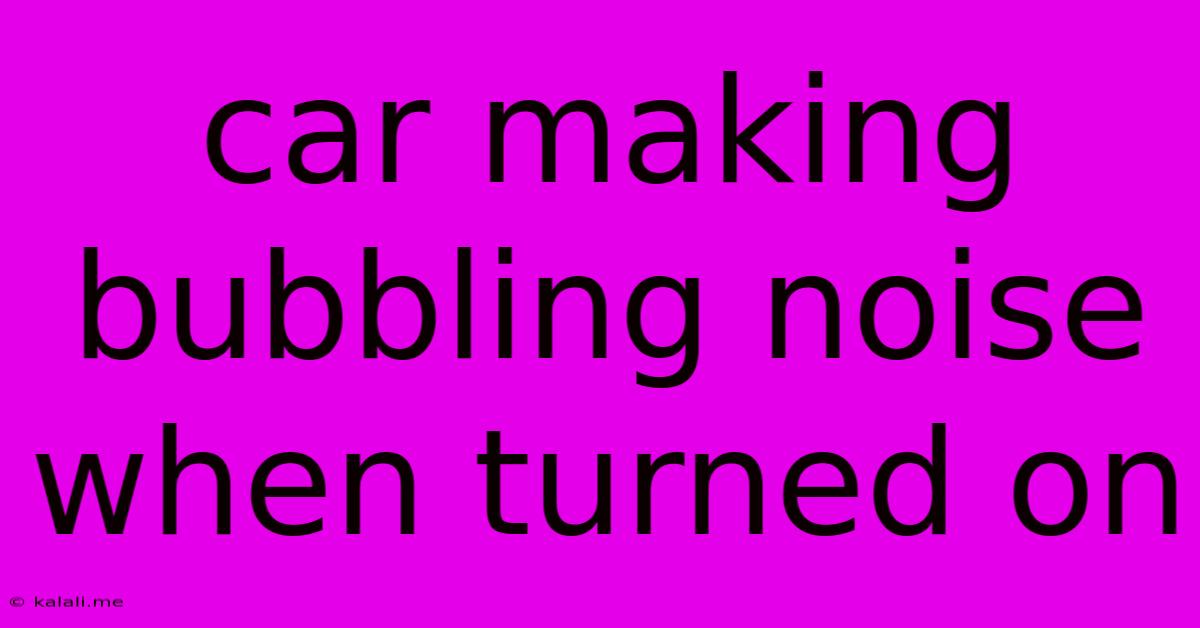Car Making Bubbling Noise When Turned On
Kalali
Jun 09, 2025 · 3 min read

Table of Contents
Car Making Bubbling Noise When Turned On: Troubleshooting Guide
Meta Description: Is your car making a bubbling noise when you turn it on? This comprehensive guide explores common causes, from minor issues like air in the coolant system to more serious problems like a failing head gasket. Learn how to troubleshoot and fix the problem effectively.
A bubbling noise emanating from your car upon startup can be unsettling. It's a sound that immediately suggests something isn't right under the hood. While it could be something minor, it's crucial to investigate and address the problem promptly to prevent more significant engine damage. This guide explores the common causes of this concerning sound and provides helpful troubleshooting steps.
Identifying the Source of the Bubbling Noise
Before diving into potential causes, pinpoint the location of the bubbling sound. Is it coming from the engine compartment, specifically near the radiator or coolant reservoir? Or does it seem to originate from a different area? Accurately locating the sound will significantly narrow down the potential issues.
Common Causes of Bubbling Sounds in Cars
Several factors can cause bubbling noises when your car starts. Here are some of the most frequent culprits:
-
Air in the Cooling System: This is often the most benign cause. Air trapped within the coolant system can create bubbling sounds as the coolant circulates. Air pockets can interfere with efficient heat transfer, leading to overheating. Bleeding the cooling system is usually a straightforward fix.
-
Low Coolant Levels: Insufficient coolant can also cause bubbling. The reduced coolant level allows air to enter the system, leading to similar bubbling sounds as an air pocket. Regularly checking your coolant levels is crucial for preventative maintenance.
-
Faulty Water Pump: A malfunctioning water pump can hinder proper coolant circulation. If the pump is failing, it may not be able to effectively move the coolant, causing pressure build-up and resulting in a bubbling sound. This is a more serious problem requiring professional attention.
-
Head Gasket Failure: This is a potentially serious issue. A blown head gasket allows coolant to leak into the cylinders, potentially mixing with the engine oil. This can lead to a range of symptoms, including bubbling noises, white smoke from the exhaust, overheating, and milky engine oil. This needs immediate professional repair.
-
Radiator Issues: A damaged or clogged radiator can restrict coolant flow, leading to pressure buildup and bubbling sounds. Inspect your radiator for leaks, cracks, or blockages.
-
Coolant Leaks: Any leak in the cooling system, whether from hoses, clamps, or the radiator itself, can introduce air into the system, causing bubbling.
-
Overheating Engine: An engine that's already overheating can manifest bubbling noises as the coolant boils and expands. This requires immediate action to prevent more severe engine damage.
Troubleshooting Steps
-
Check Coolant Levels: Begin by visually inspecting the coolant level in the reservoir. If it's low, carefully add coolant of the correct type. Consult your owner's manual for the appropriate coolant type for your vehicle.
-
Listen Carefully: Pay attention to the timing of the bubbling noise. Does it occur immediately upon startup or after the engine has run for a while? This can provide further clues.
-
Inspect for Leaks: Thoroughly examine all hoses, clamps, and connections in the cooling system for visible leaks.
-
Bleed the Cooling System (if necessary): If you suspect air in the system, consult your owner's manual for instructions on how to bleed the cooling system. This procedure releases trapped air pockets.
When to Seek Professional Help
If the bubbling noise persists despite your troubleshooting efforts, or if you notice other symptoms such as overheating, white exhaust smoke, or milky engine oil, it's crucial to seek professional help from a qualified mechanic. Ignoring a serious issue like a blown head gasket can lead to extensive and costly engine repairs.
Regular maintenance, including checking coolant levels and inspecting the cooling system, can help prevent many of these issues. Early detection and prompt action can often save you time, money, and potential engine damage. Remember to always consult your owner’s manual for specific recommendations and procedures for your vehicle model.
Latest Posts
Latest Posts
-
Combination Square How Do We Use It In Agriculture
Jun 09, 2025
-
What Is A Way To Say Made Concrete
Jun 09, 2025
-
Jazz Music Is All About Saxophone
Jun 09, 2025
-
Can You Buy A Fighter Jet
Jun 09, 2025
-
Are Legendaries Shiny Locked In Black And White
Jun 09, 2025
Related Post
Thank you for visiting our website which covers about Car Making Bubbling Noise When Turned On . We hope the information provided has been useful to you. Feel free to contact us if you have any questions or need further assistance. See you next time and don't miss to bookmark.